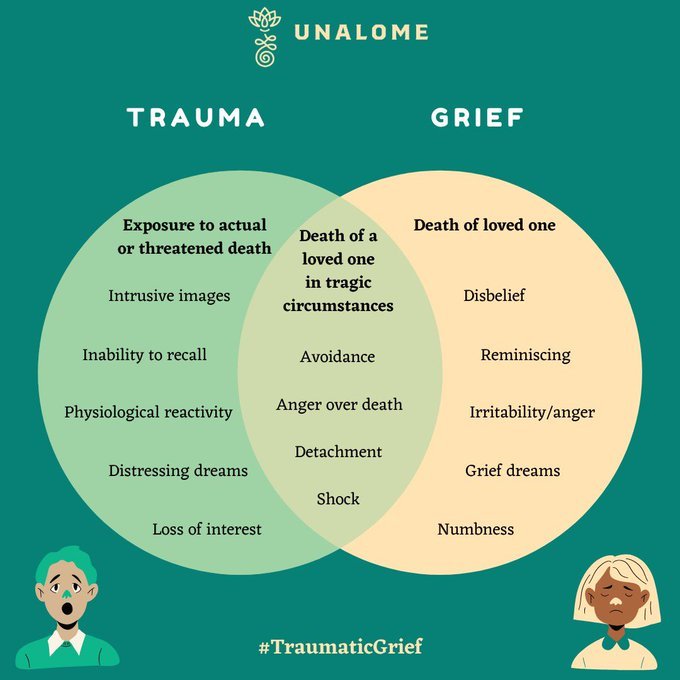The Relationship Between Grief & Trauma
With the influx of therapy-oriented buzzwords overtaking social media like “boundaries,” “narcissism,” and the ever-present, “trigger,” it is difficult to walk the line of celebrating the public’s excitement over therapeutic terms, and heeding caution against their irresponsible use. One term that has found its way into the public sphere is trauma. The focus of this post is to offer clarity on how trauma may show up for those experiencing grief.
The relationship between grief and trauma is nuanced and complex. While not every grief experience includes trauma, there is an aspect of grief in most experiences of trauma. For instance, for those grieving a loss due to a sudden or violent means, their brains may process the sudden jolt as a traumatic experience. On the other hand, for someone who has been the victim of a sexual assault- a traumatic experience- they may also grieve the loss of safety, innocence, or even a lost relationship with the perpetrator. To make things even more complicated, grief professionals may designate a certain kind of sudden or violent loss as traumatic grief.
Let’s review the definitions of these terms on their own:
Trauma: an event(s) that causes an individual significant psychological distress, which impacts one’s sense of safety or wellbeing. The effects of trauma reverberate through an individual’s nervous system, and can cause psychological symptoms such as intrusive thoughts or memories, attempts at avoiding external reminders, negative beliefs and assumptions about the world, hypervigilance and irritability, and/or feeling detached from one’s body or from the world around them. The effects of trauma on the nervous system can also have further physical repercussions like headaches, trouble sleeping, digestive issues, and even long-term effects like cardiovascular disease or arteriosclerosis.
Grief: the emotional and physiological response an individual has after experiencing a significant loss. Grief includes a collection of emotions such an anguish, confusion, anxiety, yearning, numbness, or anger. Symptoms of grief may include obsessive dwelling on the past, recurring memories, decrease in self-care, a change in assumptive world view, and fear for the future. Physiological effects of grief can include increased or decreased appetite, trouble sleeping, low energy, immune system disruption, increased stress response through elevated cortisol, and cardiovascular issues related to heart rate and blood pressure.
You may understand based on these definitions, why it becomes a complicated task then, to identify what aspects of an individual’s experience would be grief or trauma. This nuance most often comes into play when supporting those who have experienced traumatic grief. A sudden loss due to suicide, homicide or violent crime, overdose, or accident can leave an individual with all of the symptoms of trauma and grief listed above. At once, they are grieving a loss that feels surreal and impossible- their loved one was here one moment, and gone the next. Their nervous systems may start dumping large amounts of cortisol and adrenaline, preparing their bodies to fight or flee, as if the death experience is also about to happen to them.
Individuals experiencing traumatic grief are encouraged to seek support for learning to manage these emotional and physiological symptoms. Most typical grief experiences see some level of distress symptoms that shift and subside over time as one’s new normal sets in. With traumatic grief, an individual may find the nervous system effects continuing to disrupt daily functioning until addressed. Due to the ways trauma lives in our bodies, grief support for a traumatic loss may include more focus on somatic experiences and nervous system regulation. However, all grievers may benefit from support that involves a holistic understanding of brain and body throughout the grief process.
Trauma, grief, or traumatic grief, you don’t have to go through it alone. In fact, social support through co-regulation is a powerful treatment for grievers’ nervous systems to access feelings of safety. In these cases, finding a trauma-informed therapist is vital. If you or someone you know is experiencing traumatic grief, contact our clinicians at Blue Note Psychotherapy to learn about options for accessing support.

